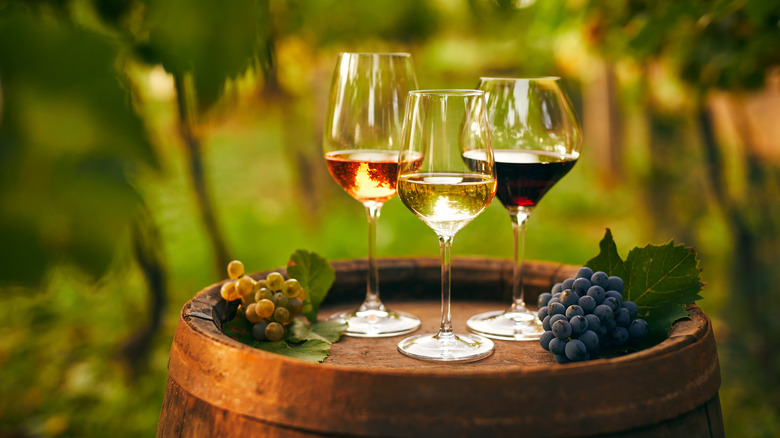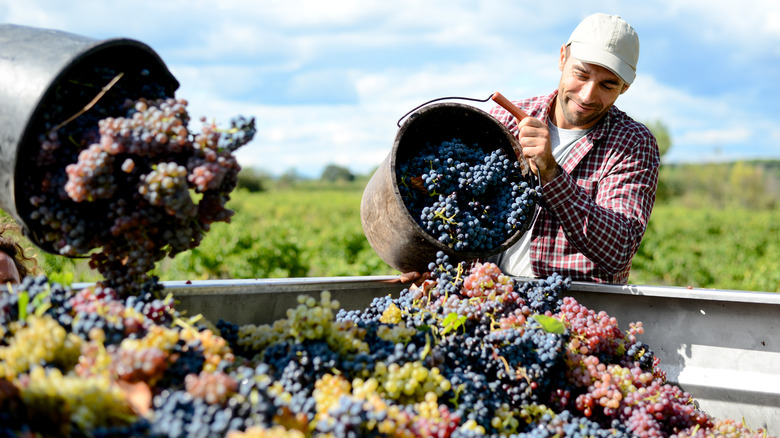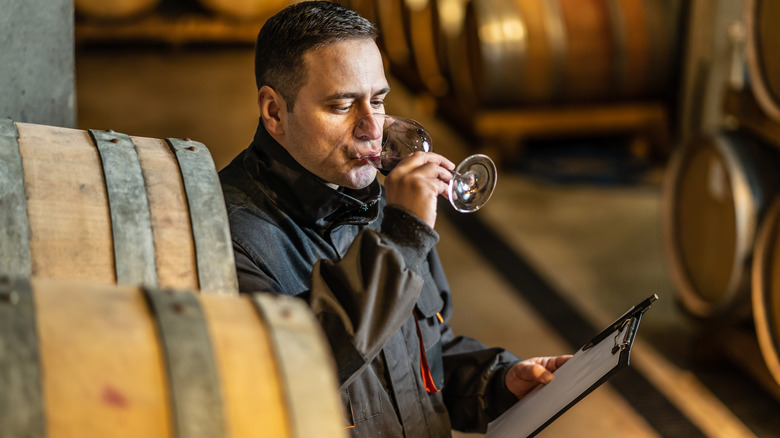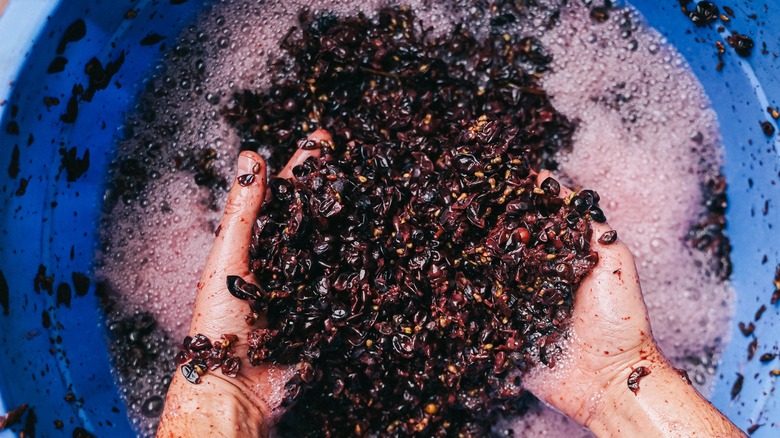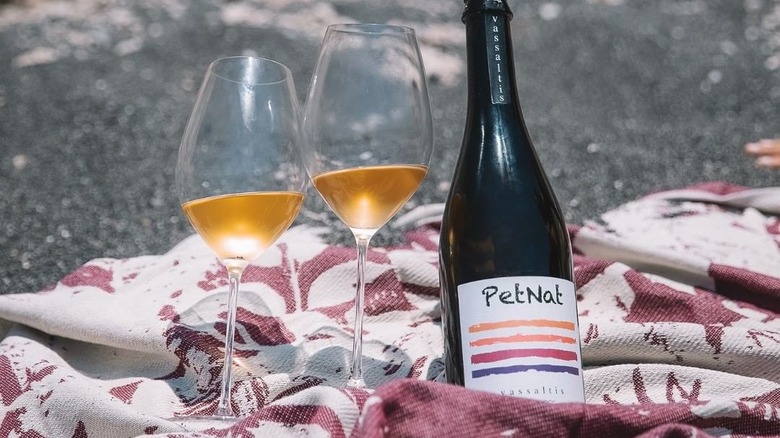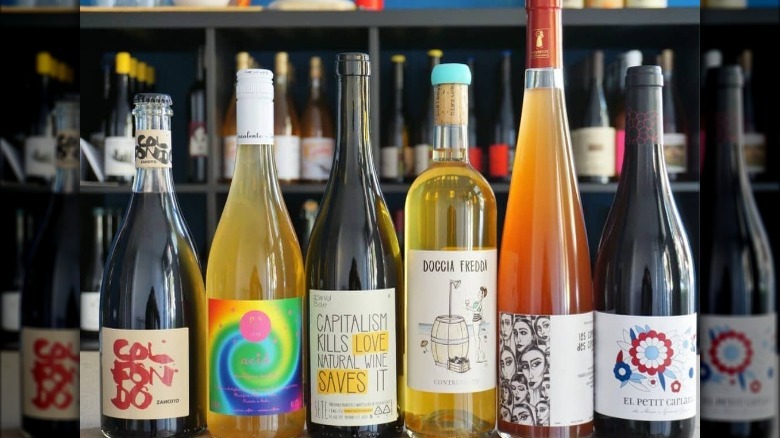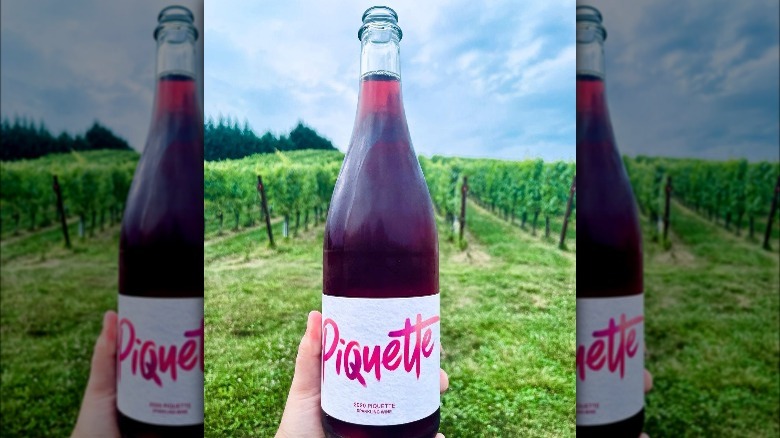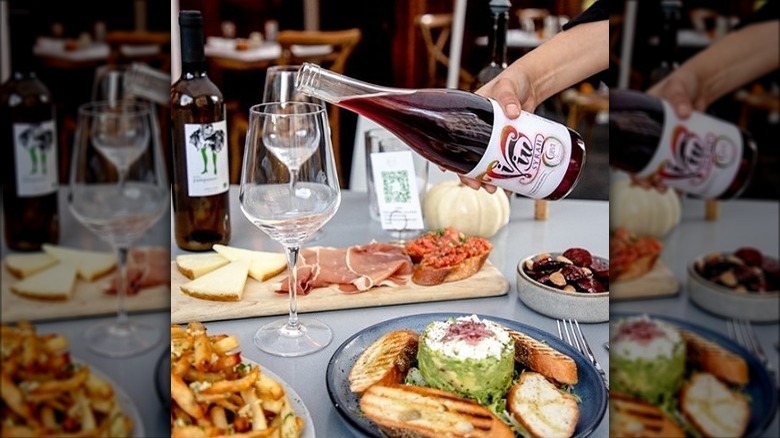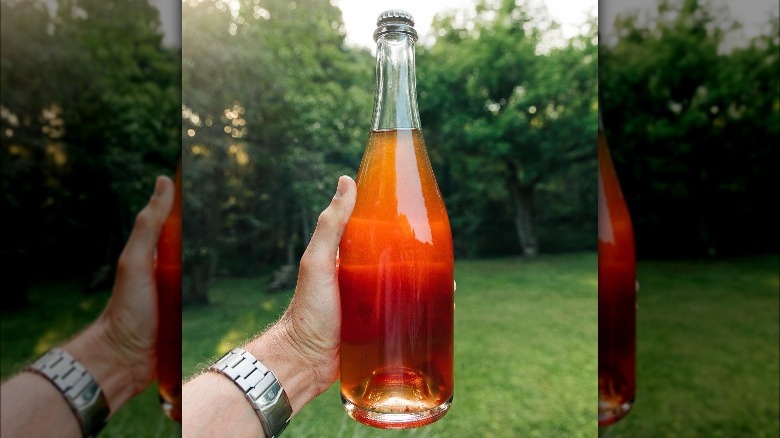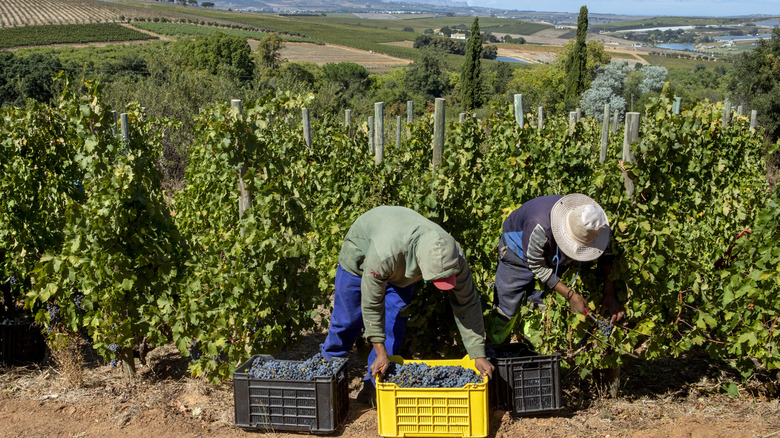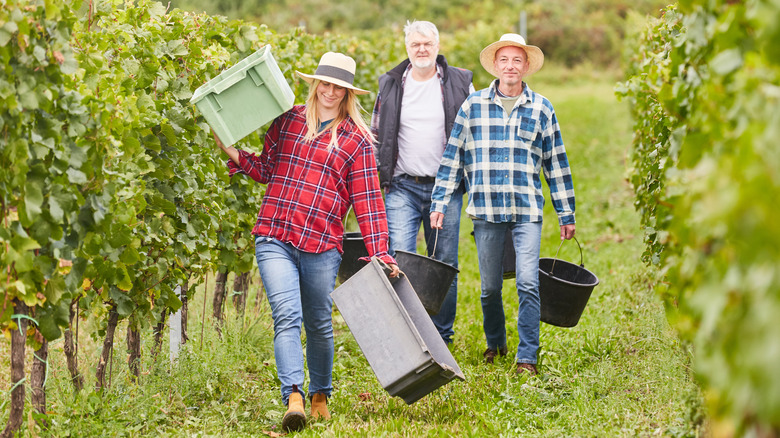12 Reasons Why You Should Drink Natural Wine
Wine drinkers are faced with an astounding number of options every time they consider buying a bottle or pouring a glass. While many of the choices consist of different grape varieties, origins, and formats, there are plenty more categories offered to consumers. Among them are natural wines, which seem to spark as much excitement as they do disdain. Yet, amidst the naysayers, there are many reasons why this classification is well worth diving into.
Although natural wine is sometimes rejected as being flawed, funky (not in a good way), and inconsistent, as with any consumer product, a range is to be expected. The fact that this style isn't fully regulated entails some outliers, but the overall quality of wine being produced should easily dispel those myths. If you're not yet convinced, we'll outline our top reasons for being avid natural wine enthusiasts and let you make the call. And if you're still on the fence? Taste a few bottles of natural wine and decide for yourself.
1. Encourage small producers
As with food or clothing, it's much easier to believe that effort and care went into a product when it's being made on a small scale. Although consumers don't always think about the brands behind a bottle of wine (except when recognizing labels), most businesses have the primary goal of profit. And while there's nothing wrong with that ambition, many components of wine production quickly become cheaper — and consequently more profitable — as volume increases, per CEO Magazine.
On the other hand, various elements required to produce natural wine (hand-harvesting, zero additives, etc.) simply do not scale up very easily. Furthermore, associations such as Italy's VinNatur define natural wine as being made in low amounts by independent producers, promoting the notion that this level of detail can only be accomplished in small numbers.
Reminding wine drinkers that the fundamental step in production is agriculture, Jonathan Nossiter's "Cultural Insurrection: A Manifesto for the Arts, Agriculture, and Natural Wine" (via Literary Hub) emphasizes the fact that farmers seek to tell the land's story. Such a concept doesn't have to remain abstract and romanticized; it can be tasted thanks to the labor of small producers who desire — often over profit — to express something seemingly intangible. The liberal creativity is certainly reflected in the glass. As Nossiter writes, "Why shouldn't the public faithfully accompany artisans who dare to experiment?"
2. Have more transparency about production
Unfortunately, so-called conventional winemaking can be shrouded in ambiguity beyond basic facts like origin and appellation. And while these facts are certainly important when choosing a bottle of wine, the background story isn't always evident (at least not without a bit of digging). Meanwhile, as noted by Wine & Food Foundation, one of the goals of natural wine is to fully showcase and display the local terroir, leading winemakers to highlight features such as specific vineyards, soil types, harvest dates, and seasonal conditions.
The fact that there is not an official certifying body for natural winemaking does not have to be to the customer's detriment. Instead, it incites producers to make a point to delineate the exact principles they follow — which can change seasonally since the outcome isn't meant to taste exactly the same year after year. It's also worth mentioning that, as pointed out in BK Wine Magazine, the term natural wine causes plenty of debates, and low or minimal intervention is often employed to paint a clearer picture.
Nonetheless, two of the associations aiming to bring some consistency to the term, VinNatur in Italy and Vin Méthode Nature in France, agree on a number of points. Among them, grapes should be free of pesticides and hand-harvested, native yeasts must be used for fermentation, no additives are permitted, and no chemical processes are allowed in the cellar.
3. Avoid unnecessary additives
As noted by Raw Wine, one of the most important factors qualifying natural wine is the exclusion of additives, including pesticides or herbicides. The line is a bit blurry in the case of sulfites which never cease to cause discussions among purists. Per Vox, the most rigid shun the use of all added sulfites, however, many winemakers choose to include a small amount before bottling the wine for preservation. Nonetheless, the volumes are about a tenth of what is used in conventional production. From a health perspective, common items such as dried fruits contain more sulfites than you'll find in most wines, according to Verywell Fit. However, natural wine proponents reject it for its tendency to dull flavor when used in large amounts.
Sulfites aside, 60 or so additives can be used while still maintaining a product that is wine. If you don't spend any time thinking about the countless ingredients in processed foods, then perhaps it's not such a big deal. However, given the fact that wine is first and foremost meant to be made from grapes, it seems like a steep number of indecipherable elements to be adding to the juice.
And if the health factor isn't of worry, perhaps the results of a 2017 study published in the Journal of Food and Nutrition will make you raise an eyebrow: more than half of the participants were able to identify which wines contained traces of pesticides. Basically, the alterations aren't even beneficial to the taste.
4. Enjoy more experimental styles
If you're the type of person who enjoys trying new things, then natural wine is the perfect way to expand your repertoire. Whereas more conventional winemaking often seeks consistency over time (as pointed out by Forbes, non-vintage Champagne house styles are the perfect example), creativity is encouraged in low-intervention production. Sommelier and Paired Media co-founder David Stevens-Castro told CEO Magazine that natural wines are ideal for wine fans who aren't afraid to step outside the box.
You don't have to completely reject more mainstream products either. Your natural wine journey should be about discovering new bottles you enjoy and identifying similar flavor profiles across your favorite drinks. For example, Matthew Gerard, director of Grand Cru Wine Fridges, tells CEO Magazine that people who enjoy the sour taste of some beers should extend their consumption to natural wines, which are commonly characterized by these flavors.
Furthermore, according to the San Francisco Chronicle, the categories of wine being made by natural winemakers have become increasingly prominent outside of these parameters. Pétillant-naturel (lightly sparkling wine), glou-glou (chuggable light reds), and piquette (a low alcohol grape drink made from leftover fruit skins and water) were originally made in the natural wine sphere. This crossover may have the positive result of opening people's minds to the wild and wide assortment of wine out there.
5. Discover unique qualities of different regions
Geographical wine appellations, as noted in Wine Spectator, define the boundaries of grape-growing regions and entail a number of regulations imposed on viticultural and winemaking activities. As Pauline Vicard explains in Jancis Robinson, this often leads to typicity, a quality initially intended to help wine drinkers become familiar with individual regions. However, producers soon began making very similar wines in order to be accepted within local conformities. Vicard writes, "Typicity slowly began to mean conformity."
Natural winemakers have already eschewed blind compliance to the industry. This experimental nature means they won't harvest their grapes on the same day as the rest of the region merely because the appellation guidelines demand it. While the average consumer might not take notice, wines labeled under appellations can only be made with specific grapes and processes, greatly limiting the potential of a region.
Thankfully, natural wine is the ideal playing ground for winemakers to test new fermentation methods, grape varieties, aging regimens, and so on. As Eric Asimov from The New York Times notes, many regional grapes and styles might no longer exist were it not for the passionate experimentation of natural winemakers. He adds, "I love the clear sense of place I often find and being able to sense the personalities of the producers in the glass." Sure it might be satisfying to taste a wine and correctly identify it as Chardonnay from Burgundy, but wouldn't it be more exciting to try something that leaves your curiosity piqued?
6. Have more low alcohol options
Natural wine enthusiasts often praise the fact that the day-after effects of low-intervention wines are purportedly less gnarly than other wines. While the veracity of these claims is not one we will tackle here, there is one aspect besides fewer additives that might help you feel a little fresher in the morning: Per Saveur, most natural wines simply have a lower alcohol content. One of the standards of production entails using native yeasts — basically what is already present in the vineyards and cellar. These strains cannot tolerate high levels of alcohol, whereas cultured yeast can easily survive a wine with 16% ABV.
Additionally, Vinepair notes that grapes in cool-climate regions that have trouble fully ripening traditionally undergo chaptalization in the cellar. This step entails adding sugar to the grape juice in order to boost the final alcohol content. Conversely, sugar is certainly not being added to natural wine, resulting in a lower ABV.
Aside from the production aspect, styles typically associated with natural wine such as glou-glou and piquette are inherently lower in alcohol. Light chillable bottles of red wine are by nature in opposition to heavy tannic high alcohol products.
7. A wider range of food pairings
Many guidelines for food and wine pairings consist of classic familiar combinations. A steak and Napa cabernet, oysters and Champagne, blue cheese and Port — these duos are delicious for a reason. Nonetheless, they can feel rigid at times, whether you actually feel constrained in practice.
Natural wines, on the other hand, have many qualities that make them food-friendly. MYSA Natural Wine simplifies the options with a compilation of suggestions based on an endless array of proteins, starches, vegetables, and seasonings. The source also outlines a number of relevant characteristics including grape varieties, fermentation styles, skin contact, and age, so that consumers can make choices for themselves.
In a chat with Maapilim, natural winery owner Ramon Jané Garriga attributed the wine's freshness to its ability to complement lighter dishes, especially due to its fruity, high-acid nature. Meanwhile, Dante DeCicco of The Natural Wine Shoppe explained to La Cucina Italiana that many of the unique characteristics of natural wines make them well-suited to particular dishes. He cites orange wine and seafood as a delightful pair, highlighting that he not only drinks these wines but cooks with them too.
The fact that natural wines are generally lower in alcohol makes them easier to match with a wider range of preparations. For example, spicy foods are intensified with tannin, oak, and high alcohol, factors that aren't usually associated with natural wine. Your glou-glou red? A chilled glass might be the perfect pairing for that spicy chicken dish.
8. Taste wine that is alive and evolving
The concept might initially cause you to raise a skeptical eyebrow, but natural wines are alive and in a constant state of evolution. RAW Wine, an active group of low-intervention winemakers and drinkers, explains that since natural wine largely entails abstaining from removing or adding anything, the final product contains living biological organisms.
Eric Asimov from The New York Times notes that the RAW Wine community even personifies natural wine, attributing it to human traits like emotions. Founder Isabelle Legeron uses descriptors such as "strong personality" and "self-expressive" to depict a beverage that most people merely associate with grapes. While Asimov concedes that these qualities might be questionable, he points out that a wine viewed as more dynamic and vibrant is undoubtedly praiseworthy. What's more, he writes, "They are not only a pleasure to drink, they also make you feel healthy and good."
In an interview with Pix, MYSA Natural Wine founder Holly Berrigan explained that the presence of microorganisms in the wines gives them an additional textural quality. As she put it, "More like a little dance on your tongue." Nonetheless, there is a fine line of care required when dealing with this lively activity in the cellar, and winemakers must be especially vigilant to ensure wines don't spoil.
9. Support regenerative agriculture
First and foremost, good wine starts in the vineyard. That being said, viticulture can take on many different faces. From chemical fertilizers and pesticides to unlimited water use, it's not always a pretty picture. Natural wine growers prioritize regenerative agriculture and working in harmony with the land to maintain resources. Typically, grapes are grown following organic or biodynamic standards and dry farming is the norm, according to Vivant.
The outlet highlights the importance of healthy soil in farming grapes for natural wine, including characteristics such as an active microbiome and resistance to droughts or excess rain. Meanwhile, speaking with Forbes, natural winemaker Tony Coturri emphasized the role of cover crops in the vineyards, which are used to nourish the soil and promote a symbiotic cycle of growth. Additionally, Vivant notes that machines are largely out of the picture, allowing the lighter touch of a human hand to tend to the vines and reduce carbon emissions.
Growing up with a viticultural background, Tom Gamble of Napa's Gamble Family Vineyards distinguishes between sustainable and regenerative farming, telling SevenFifty Daily that the former "requires one to consider the entire ecosystem under one's stewardship." This holistic approach has led the way to a certification program with the goal of improving conditions on any given farmland worldwide as we face a number of outcomes related to climate change.
10. Engage in more conscious consumption
Consumption habits can say a fair bit about a person, whether or not the behaviors are conscious. While we might think that by making sustainable choices in one area of purchasing (buying organic produce for example) we tend toward similar-minded decisions overall, a 2022 study published in the Journal of Business Research indicates otherwise. According to the results, although you might continue favoring organic vegetables, you won't necessarily start driving an electric car.
This spillover concept of behavior is worth considering in the context of wine. As Nathan Ratapu owner of Thirsty Wine Merchants in Brooklyn told The New York Times, the notion of fewer additives and processing in food is generally agreed to be preferable, and the same should be said of wine production. If you value what you are putting into your body and make a concerted effort to prioritize healthy choices, natural wine should be the obvious decision (that is if you're drinking alcohol at all).
Aside from the wine's constituents, RAW Wine points out how viticultural practices used in making natural wine focus on respecting the environment and minimizing pollution and other negative effects of large-scale farming. Emphasizing the importance of organic produce while you sip a glass of conventionally made wine misses the point.
11. Greater sustainability in winery practices
The environmental benefits of regenerative agriculture are essential, but there is more to a winery than its vineyards. Between issues such as recycling, water consumption, labor conditions, and distribution, many facets are involved. Although sustainability is often knocked for being vague, it's worth applauding communicated measures. Per The Momentum, elements under the umbrella of natural wine are sustainable by definition. Factors such as electricity use in the winery are perhaps last on your mind when considering the sustainability of a bottle of wine. Nonetheless, low intervention means less equipment and electrical activity, ultimately a win for sustainability.
If vineyards are managed with deeper care for their immediate and surrounding environment, congruity with local communities is fostered. These connections not only build trust between a winery and its larger setting but can promote collaborations that benefit all. Would you prefer living next to a vineyard continuously spraying pesticides or one that nixes chemicals? Ditto for working in it.
As for harvesters, SevenFifty Daily brings up the fact that industry standards still leave much to be desired. Issues such as less than minimum hourly wages, lengthy workdays, and lack of housing and meals, must be evaluated when workers are going to a site for the duration of harvest. To guarantee satisfying conditions, a number of natural winemakers and importers have sought solutions. For example, Super Glou lists labor facts for all of the producers it distributes, to uphold the values of the industry.
12. To make a statement
Whether we realize it or not, our purchasing habits communicate a lot about the type of people we are. While companies often use this to their advantage, individuals can have a say too. Natural wine sends various messages that can change contextually. Choosing a hip natural wine bar over any ordinary establishment might make you appear avant-garde to one friend whereas another might snub you for being a wine snob.
Trendiness aside, many natural wine drinkers prioritize products with minimal intervention and fewer additives. You might not follow all ecological tenets across behaviors, but drinking natural wine is one way to demonstrate you care about environmental impacts. For some people, the planet is at the heart of their choice to opt for the natural stuff, however, others prefer the artisanal quality of smaller producers. Wanting to support the proverbial little man instead of feeding into a multibillion-dollar industry is a worthy pursuit.
Fariha Roisin views natural wine as a form of self-care, writing in The New York Times, "Holistically caring for yourself, and being cognizant of consumption, is a political statement." An increasing number of luxury restaurants now serve natural wines, and it sure seems like a win for all. As Hospitality Insights notes, "In turn, consumers perceive these wines — and the establishments that serve them — in a favorable light in terms of both social and ethical responsibility." Ultimately, the title of an article in The New Yorker says it all: "How natural wine became a symbol of virtuous consumption."
